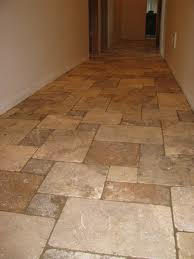
Travertine is a beautiful flooring material. I’ve been in a thousand homes and seen travertine in some of the finest homes in California. Tumbled travertine is a rustic version of the same material, but elicits an “Old World” feel, and because of its rustic look—(it doesn’t show dirt) is considered more forgiving than a smooth travertine floor.
Whatever type of travertine you have or desire, these are the Five Things You Should Know about the material to maintain this wonderful natural product.
1) Travertine is porous. Unlike ceramic tile or porcelain, travertine is much softer and has many more capillaries to trap and absorb dirt.
2) Travertine can scratch. Because it’s a natural product, and because it has not been fired in an oven like ceramic or porcelain, it’s a softer flooring material. This means that moving a metal chair, a fridge or other hard object can scratch the floor. Fortunately, in most instances, the scratch can be honed (wet-sanded) and return the floor to its original condition.
3) Travertine is honeycomb in composition. Besides being microscopically porous, the tiles have actual holes in the structure of the stone that require filling at the factory. Since not all the “bubbles” intersect with the surface of the stone, some holes are not filled and manifest later as holes due to high traffic and foot weight.
4) Travertine can etch. Because travertine is in the calcium-carbonate family along with marble and limestone, travertine will react to acids. (Check out our video “How to Remove an Etch Mark from Travertine). This means anything acidic, from lemon juice to a spilled jar of pickles, will etch your floor. (An etch mark looks like a foggy, white spot on your stone that won’t clean off).
5) Travertine needs to be sealed. Because of its porosity, travertine demands sealing to coat the capillaries and increase the ease of cleaning. Also, by sealing, you are protecting the stone from water penetrating through and into the substrate. With too much water penetration (as in a shower) the stone will start to degrade.
These are the Five Things you Need to Know about Travertine. If you have any further questions about travertine or other stone applications in your home, feel free to call us at:
Appleby Cleaning and Restoration: (925) 866-1333.

